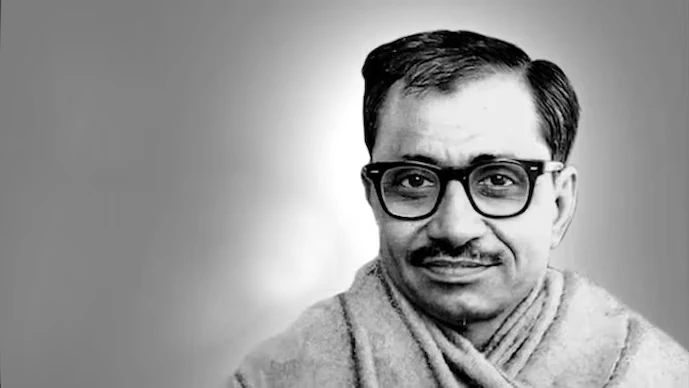
Deendayal Upadhaya Is More Relevant Today
In the last hundred years world has made a very significant material progress in terms of technology, production of material goods and expansion of economic services like never before. If we try to measure this progress in terms of GDP, we see GDP of the world has increased - fold in the last hundred years. Industrial revolutions at different stages, have contributed to this material growth. Generally people are consuming more goods and also of better quality. Progress in the field of infrastructure, automobiles, aviation, space, communication etc. has been most notable. But at the same time humanity sacrificed its very basis of survival with environment deterioration economic inequalities and societal disintegration. Our society and the economy have reached to a level where, we see that the humanity is facing a real danger of extinction if something is not done to cure these ills. The root cause of the present day ills is that we have assumed that if there is a material progress in terms of production of more goods and services if there is more of an energy consumption if the GDP increases, it means development is taking place. It was assumed that problems being created by such material progress will automatically be taken care of, as the benefits of this increased production will automatically percolate down to the masses, making their lives better. But what we see on the ground, inequalities increasing exponentially, where a few enjoy luxuries and masses reel under poverty. Perhaps, no thought was given to the deterioration in environment. We see that there is a continuous increase in the greenhouse gases emissions over the decades, global temperature rising as never before, and increased by nearly 2°C, causing glaciers to melt, sea level to rise, endangering habitations around sea, air quality getting worst, making it difficult to even breath, water and soil getting polluted like never before and thereby making earth unlivable. With material progress, humanity suffered another blow in the form of lust and greed to achieve material progress, with societal and family disintegration. This deterioration in values got further accentuated with rise of individualism.
Today, GDP growth is considered an important measure of development. But does GDP represent the well being of all and protection of environment; perhaps not. GDPs of the nations can increase also with increased production of war goods, deforestation, increased incidence of diseases etc. Therefore, we cannot consider increase in GDP to be an equivalent to more happiness. It is even more unlikely that increase in GDP would help improve the lives of the people at the bottom of the pyramid. Alternatively, Deendayal Upadhaya provides an alternative philosophy of development. Where is philosophy what we call Philosophy of Integral Humanism (Ekatma Manav Darshan). Upadhyay ji's philosophy states that true development is one that brings happiness and comfort to the last person in society, that is, Antyodaya. The benefits of economic growth are incomplete unless they reach the most vulnerable sections of society. This same idea can also guide today's policies of social justice and inclusive development. India's cultural tradition has always been based on the idea that man is not merely an economic entity, but represents a holistic entity comprised of body, mind, intellect and soul. Based on this profound understanding, Pandit Deendayal Upadhyaya presented the Integral Human Philosophy. This philosophy was a guidepost for India's development journey even then, and its relevance has increased even more today, when global economic inequality, social fragmentation, and environmental crisis are deepening.
Today's policies are primarily based on material progress. Even in education, health, and technological advancement, the goals are often considered to be "competitive advantage" and "economic gain." However, humans are not merely physical entities; they possess mental, intellectual, and spiritual dimensions. If development is limited to the body and material resources, society becomes unbalanced and stressed. Upadhyaya's philosophy reminds us that development is only real when it nurtures all these aspects of a person in a balanced manner. Social and economic inequality has long been a challenge in India. Caste, religious, and class divisions still try to divide society. Upadhyaya sees society as a "living body," where each organ has its own specific role, and no organ is more or less than another. This vision establishes harmony, not equality, in society, where everyone enjoys equal dignity and importance. This idea has become even more essential in today's fragmented society. The biggest challenge of the 21st century is climate change and the environmental crisis. Continuous industrialization and consumerism have led to excessive exploitation of nature. At such a time, the Integral Human Philosophy tells us that humans and nature are not enemies, but rather in a symbiotic relationship. Unless development is environmentally friendly and balanced, it cannot be sustainable. This vision is deeper than modern sustainable development because it is based not only on resource conservation but also on the Indian culture of considering nature as family. In the era of globalization, economic policies revolve around multinational corporations and market forces. This has increased the threat to cultural identity and economic independence. The Integral Human Philosophy calls for a return to 'Bhartiyata', that is, Indianness. It says that policies should be based on our cultural consciousness and local conditions. Today, this philosophy can prove to be a guiding light in national campaigns like "Self-reliant India" and "Developed India".


